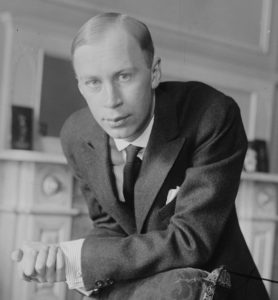On May 2, 1936, Sergei Prokofiev’s Peter and the Wolf was performed by the Moscow Philharmonic Orchestra for the first time. While not composed as an ecological treatise, the musical piece earns itself an honorary appearance in the history of conservation as one of the most beloved children’s compositions of all time—and it does involve several species of wildlife!
Prokofiev was a well-known composer when he took on the task of writing Peter and the Wolf. He was asked by Nataliya Sats, the director of the Moscow Children’s Theater, to write music to accompany a narrative about a strong-willed boy who defied his grandfather. The purpose was to introduce the instruments of the orchestra to young listeners. Prokofiev was well-suited to the task, as he had composed several other children’s pieces. However, he rejected the text provided to him, instead writing his own story.

The hero is Peter, a Pioneer—the Soviet equivalent of a Boy Scout—who, against his grandfather’s warning, ventures into the woods with his companions: a duck, a bird and a cat. They meet a wolf who eats the duck and then—but you all know the story. The story is, in fact, adapted from the Russian folk tales of the young and resourceful Ivan Tsarevich, who tangles with all manner of creatures from wolves to firebirds to magical lions and frogs.
Peter and the Wolf moves on from traditional folk tales to more modern lessons appropriate for students of the soviet movement. First is the lesson that the old established regimes—in the person of a grumpy grandfather—must make way for the ways of adventurous, questioning and independent Bolsheviks like Pioneer Peter. Second, however, is the lesson that mastery over nature is part of the soviet ideal. The wolf loses in this narrative, trapped by the cunning Peter and hauled off to the zoo in a military-style parade.
I prefer a more nuanced interpretation. Consider the various relationships that we can observe between humans and nature. Peter wants to experience nature instead of being trapped inside the domesticated confines of a fenced farmstead. But he takes with him his humanized animal friends, complete with names—Sasha, Sonia and Ivan. The food web is displayed as the wolf eats Sonia. Fear of the danger of nature is the underlying premise of the narrative, but that danger is overcome as both Peter and the hunters demonstrate their domination over nature when they capture the wolf. But human kindness is again displayed as instead of killing the wolf, it is saved for a zoo or, in some later versions, banished back to the wilderness. Oh, and along the way, Sonia escapes unharmed!
Peter and the Wolf is believed to be the most performed and recorded piece of classical music ever written. More than 400 recording are available. Most serious and not-so-serious actors have jumped at the chance to narrate the piece, including Sting, Patrick Stewart, Sophia Loren, Sean Connery, Captain Kangaroo, William F. Buckley, Allan Sherman and Weird Al Yankovic. Prokofiev was so mesmerized by the project that he wrote it in just one week. As his biographer related, “That he never forgot what it meant to be a child, and how children think, is evident in the playful but never condescending music he wrote for them, most of all the phenomenally successful ‘Peter and the Wolf,’ written when Prokofiev was a boy of forty-five.”

References:
Historical Boys Uniforms. Young Pioneers. Available at: http://histclo.com/youth/youth/org/pio/pioneer.htm. Accessed May 1, 2017.
Morrison, Simon. 2010. The People’s Artist: Prokofiev’s Soviet Years. Oxford University Press, Oxford. 512 pages. Accessed May 1, 2017.
Russian Crafts. Ivan Tsarevitch and the Gray Wolf. Available at: https://russian-crafts.com/tales/ivan_tsarevitch.html. Accessed May 1, 2017.
Smith, Tim. 2008. Essay: Prokofiev’s “Peter and the Wolf.” Public Broadcasting System, Great Performances. March 26, 2008. Available at: http://www.pbs.org/wnet/gperf/peter-the-wolf-essay-prokofievs-peter-the-wolf/27/. Accessed May 1, 2017.
